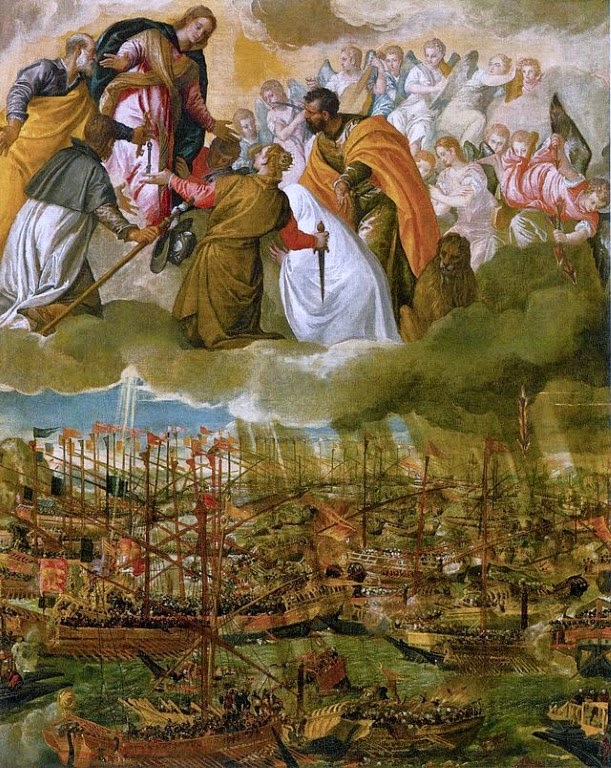 |
| Paolo Veronese, The Battle of Lepanto (1572) |
On Sunday, I stumbled upon a group of Venetian nationalists commemorating the Battle of Lepanto, which occurred 443 years ago today, October 7, 1571. I spoke to one of the men, who explained that they wanted to remind people of the battle (and of Venice’s contributions to the victory), because the Italian government didn’t emphasize it. That lack of emphasis is doubly so in the United States, where I doubt many people, including Christians, have even heard of the Battle of Lepanto. That’s a shame, because it’s quite possibly the reason that Western Civilization as we know it still exists, and the victory is due to Our Lady of the Rosary.
So why should you care about a 16th century naval battle? Here are five reasons:
- If the Catholic forces of the Holy League had failed back in 1571, Europe (and thus, the New World) might well have become part of the Ottoman Caliphate. So, if you’re reading this in a historically-Christian / Western country, Lepanto is a major part of your history.
- The battle marked a turning point in the Caliphate’s attempted domination of Europe: as a navy, the Ottoman Empire never recovered from Lepanto.
- The triumph of Christianity and Western civilization at Lepanto was accredited to the Virgin Mary. In fact, when Mary is referred to as “Our Lady of Victory,” the victory in question is Lepanto. That’s how significant this battle was.
- Lepanto is the reason that today’s feast day is Our Lady of the Rosary.
- The battle of Lepanto sheds light on the religious and political realities of today.
On one side of the battle was the Ottoman Empire, which had been aggressively expanding for over two centuries by this time. They were at war with the Republic of Venice, but were also attacking other European ships, including those coming back from the New World. On the other side was a coalition of Christian nations called the Holy League. They were organized by Pope Pius V to defend Christian Europe against these Turkish would-be invaders. As T. C. F. Hopkins notes, the Holy League was remarkable in bringing together most of Europe, including nations who normally were at each other’s throats:
The Victors of Lepanto (John of Austria, Marcantonio Colonna, and Sebastiano Venier) The last crucial addition to the mix was an energetic – not to say fanatical – new pope, Pius V, who fired up religious fervor in support of the European powers, and in so doing gained – after sustained effort – the wholehearted support of Spain. Felipe II went so far as to order his Sicilian fleet, which until this point had been ordered to avoid assisting other Christian ships against Ottoman foes, to join in with other European forces in repelling the Turks. The foundation for the return of the Holy League was laid, embracing Spain and all the European Spanish territories, including Majorca, Minorca, the Two Sicilies (Naples, southern Italy, and the island itself). Franche-Comté in central-eastern France, the Piedmont to the southeast of France, Sardinia, most of what is now Belgium and the Netherlands; the eastern Hapsburg Empire based at Vienna in Austria and including German, Czech, and Hungarian territory. In addition to this formidable union were the Papal States in Italy; the Spanish client states of Genoa and Corscia, and the ports that were controlled by Genoa; and the Republic of Venice. [….]This unlikely European group entered into a rickety alliance, goaded and pressured by the Pope, who sent out an urgent summons to Catholics everywhere to support this stand against the expansion of Islam. Catholic volunteers came from as far away as Britain and Scandanavia to support the efforts of the Holy League against the Muslim Turks, and for one of the few times in the post-medieval society of the sixteenth century, Europe managed to agree upon the necessity of addressing a common threat. [….]As is obvious, the Hapsburgs were crucial to the struggles against the Ottoman Empire – the eastern and western Hapbsurg Empires [the Holy Roman Empire and Spain] controlled almost seventy percent of the wealth of Europe, and directly or indirectly ruled over the fortunes of two-thirds of its inhabitants, and had connections, through treaties and marriages with every royal House in Europe. In the long history of the House of Hapsburg, its influence was at its greatest in the sixteenth and seventeenth centuries, and was never more crucial than at this juncture in European/Ottoman affairs.
The Ottoman capture of Cyprus – a longtime Venetian island in Greek waters, and a prize for Europeans and Turks alike – provided an impetus and a focus for European fury, for upon the fall of the fortress city of Famagusta, the Ottoman forces under Lala Mustapha, acting against the terms of surrender of the city, humiliated the revered Venetian commander, Marcantonio Bragadin, and abrogated the terms of the truce they had just concluded, sacking the city, plundering the houses and businesses there, and taking its inhabitant captive to sell as slaves to faithful Ottoman slave merchants.The Ottoman victors then publicly flayed Bragadin alive and had his skin stuffed with straw, which Lala Mustapha sent back to Turkey to be further degraded in a number of public displays, a deliberately provocative act that Venice could not and would not tolerate, let alone ignore, as this was a direct challenge to the Venetian presence in the Greek Islands as had ever been issued.
The Holy League responded by sending a fleet to fight off the Turks, consisting of six galleasses and 206 galleys. This compared to an Ottoman force of 251 ships (206 galleys and 45 galliots). Seeing the three galleasses leading the fleet, the Ottomans mistook them for merchant ships and set out to attack them. That proved to be a fatal mistake. By the time the battle was over, the Ottoman fleet was virtually destroyed: the Holy League sank 50 of the Turkish ships, and captured another 137 (leaving the Ottomans with just 64 of their original ships). Besides crushing the Ottoman navy, this victory also meant that some 15,000 Christian slaves were freed.
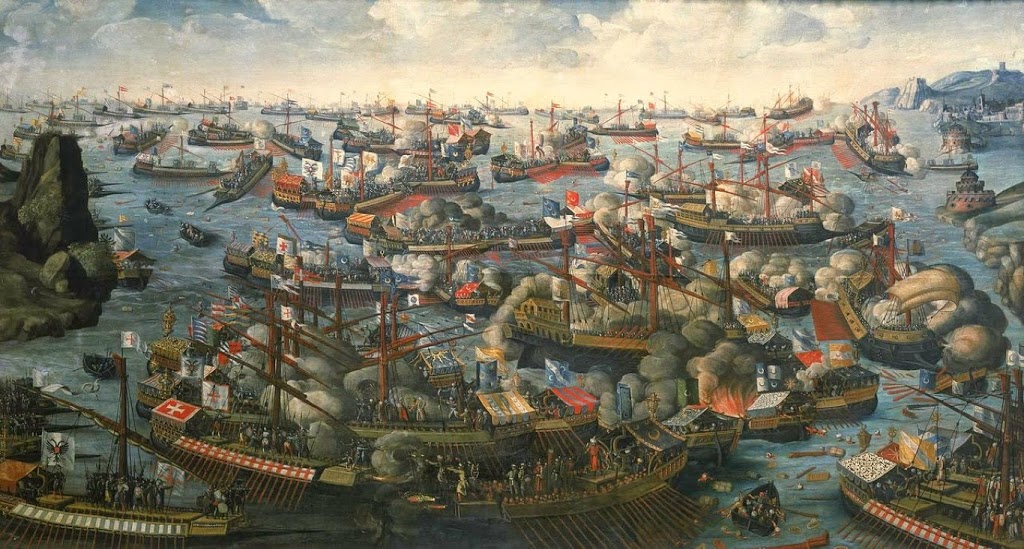 |
| H. Letter, Battle of Lepanto 1571 |
Although the Ottoman Navy would rebuild its fleet, many of its finest sailors were dead or captured. Both the Turkish menace on the high seas and the threat of an Ottoman coastal invasion were greatly diminished. Pope Pius V, of course, was jubilant, and responded by creating today’s feast day, originally called Our Lady of Victory. The Holy League likewise credited their victory to Mary’s intercession, both due to the many Rosaries prayed, and the presence of a holy image of Our Lady of Guadalupe (brought over from the New World) aboard one of the Genoan ships.
That’s Lepanto in a nutshell. But I think it’s important for how we think about Christian-Islamic history, particularly the Crusades, and how we ought to understand Islam.
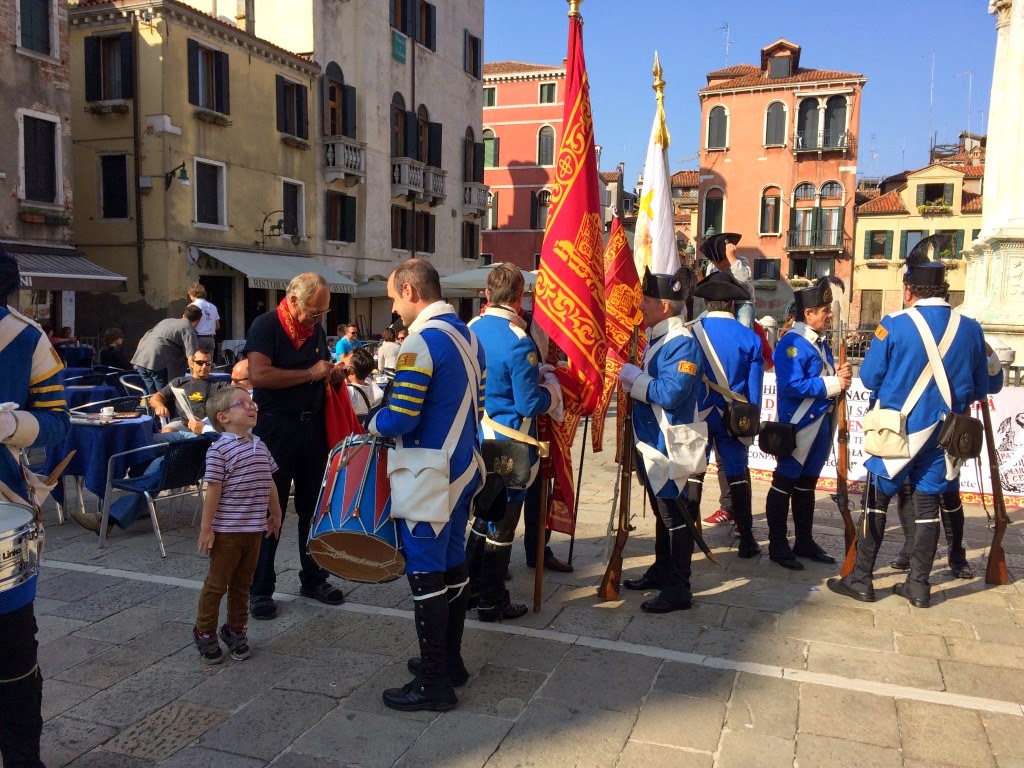 |
| Members of WSM Independence (a Venetian nationalist movement) celebrate the Battle of Lepanto. |
The Battle of Lepanto was by no means the only time that Muslim forces (particularly the Umayyad and Ottoman Caliphates) attempted to conquer Europe for Islam. At various times, they conquered Spain and Portugal, southern Italy, Cyprus, Crete, parts of Eastern Europe, etc. Nor was it only Europe: Muhammad succeeded in unifying the Arabian peninsula by conquering the city of Mecca. For the next several centuries, there were frequent Muslim conquests of new lands: the Eastern half of the Roman Empire, Persia, parts of India, the Holy Land, North Africa, etc..
It would be only a slight exaggeration to say that, when the Catholic Church wanted to spread her religion to a new land, she sent missionaries, while her Muslim counterparts sent armies. This left Christian Europe with two options: surrender, accept dhimmitude, and watch Christianity get snuffed out of Europe in the way that it was in the Holy Land and North Africa (each of which were once strongholds of Christianity), or fight a war of self-defense.
The battle of Lepanto must be understood in light of that history. So, too, must the Crusades. Most modern treatments paint the Crusaders as the bad guys, more-or-less randomly invading the Holy Land to violently spread Christianity. The popes who called the various Crusades also come in for particularly rough treatment, since it seems so incongruous for the head of Christianity to be starting a war. But in fact, these were primarily defensive wars, resisting Islamic expansion and oppression. The Christians of the Holy Land and of the Eastern Roman Empire were too weak to defend themselves, so the pope called on Western Christians to come to their aid.
Recall that before the pope’s formation of the Holy League, the Spanish fleet wouldn’t lift a finger to help other besieged Christian ships. Left to their own devices, the Christian states were too often bickering (and even going to war with one another) to come together for mutual defense. The pope alone possessed the authority and gravitas to move above much of this nationalism and self-interest. But even the pope’s authority had its limits. In fighting off Muslim invaders, Christians were guilty of two nearly-fatal sins:
- Apathy: It was easy for Christians in Europe to ignore the plight of overrun Christians in the Holy Land and Africa, and it was easy for Western European Christians to ignore the plight of besieged Eastern Christians. But this was shortsighted as it was selfish. The Islamic expansion wasn’t about conquering Arabia, or India, or Egypt. It’s always been about trying to conquer the entire world. Letting the Christian nations around you get gobbled up before you act isn’t just selfish, it’s stupid. It’s reminiscent of that famous Martin Niemöller poem.
Fortunately, the pope, responsible for the spiritual welfare of all of Christianity, couldn’t write off the oppression of these Christians as someone else’s problem. And he still can’t. Pope Francis has called out the daily Muslim persecution of Christians in Syria and Iraq, which most Western Christians seem content to ignore.
- Heresy, Schism, and Disunity: North Africa was, for several centuries, one of the major strongholds of Christianity. So how did it get conquered by Muslim hordes, and so quickly? There are several factors, but one of them is this: Eastern Christianity, on the eve of the Islamic invasion, was largely heretical. This matters for two reasons. First, it made the various Christian groups (Monophysites, Nestorians, etc.) less likely to trust one another. Second, many of these groups were persecuted by the Eastern Roman Empire, which was Catholic. The conquering Muslims, in contrast, made no distinction between Catholics, Monophysites, Nestorians, or any other Christians: all of them were promised the same treatment as dhimmi (second-class citizens, basically). So many of these heretics actually sided with the Muslim invaders. This strategy was also self-defeating, as you can see from looking at (or for) Christians in the Holy Land and North Africa today.
Both of these issues came up at Lepanto. The French didn’t opt in to the Holy League, both because of fears of civil war with the Protestant Huguenots at home, and because they had scandalously entered into an alliance with the Ottomans.
Meanwhile, none of the Protestant countries joined the Holy League. As I’ve mentioned before, many of the early Protestants actually rooted for the Ottomans to win. Shortly before Lepanto, the leader of the Dutch Reformation, William of Orange, conspired with the Ottoman invaders to attack Spain, as the Dutch were rebelling from Spain at the time. They even made medallions (seen on the right) that said, Liever Turks dan Paaps (“Rather Turkish than Papist”) on one side, and En Despit de la Mes (“In Spite of the Mass”) on the other.
England also allied with the Turkish invaders, with Queen Elizabeth appealing to them on the grounds that both Protestants and Muslims detested Catholicism and its “idolatry.”
This ambiguous position on the Ottoman invaders dates back to Martin Luther himself, several decades earlier. In 1518, Luther denounced the Crusades, on the grounds that “to fight against the Turk is the same thing as resisting God, who visits our sin upon us with this rod.”As the Turks advanced towards Luther’s Germany, he quickly clarified (or changed) his views:
From this article they may get it, who say that I prevent and dissuade from war against the Turk. I still confess freely that this article is mine and that I put it forth and defended it at the time; and if things in the world were in the same state now that they were in then, I would still have to put it forth and defend it. But it is not fair to forget how things then stood in the world, and what my grounds and reasons were, and still keep my words and apply them to another situation where those grounds and reasons do not exist. With this kind of art, who could not make the Gospel a pack of lies or pretend that it contradicted itself?
Luther’s position was now that Catholicism and Islam were equally evil, and Protestants should “Treat the one like the other and no one is wronged; like sin should receive like punishment.” But since, unlike the pope, the Muslims were actually using murderous force, this meant that Protestants could fight back against them. Needless to say, a papal Crusade to fight against the Muslim invaders was unacceptable: it had to be done by the civil authority, instead. Such an approach, of course, was exactly the problem. With each country left to fend for itself, there was no united front, and the parts of the world that took this approach were quickly overrun by the Muslim hordes.
 |
| A map showing the expansion of the Islamic Caliphate from 622-750 |
Finally, it’s timely as well to consider the Islamic half of the equation, since we see this sort of imperial Islam today. Although it is nowhere near as powerful as the Ottoman Caliphate, militant Islam once more threatens world peace and global stability. The Christians of the Holy Land and Middle East are on the verge of extinction in many places, leading the Patriarch of Babylon of the Chaldeans to issue an urgent warning to the West.
Many people are quick to point out that these radical Muslim jihadists don’t represent Islam. I appreciate the sentiment, as I wouldn’t want to be represented by self-proclaimed Christians like the Westboro Baptist Church, and I’m grateful that a great many Muslims aren’t pro-jihad.
But at the same time, I can’t help but feel that this is a bit of a red herring. It’s hard to deny that the jihadists in question are acting on a religious impulse. As a non-Muslim, it’s virtually irrelevant to me whether or not the jihadists are interpreting the Qu’ran in the way that their warlord founder intended. After all, I view all versions of Islam as fundamentally mistaken, which is why I’m not a Muslim.
But in any case, it seems clear that these jihadists are finding something in their religion that is motivating this. Because whether their interpretation of Islam is correct or incorrect, it’s certainly not rare. About a quarter of Muslims worldwide report believing that suicide bombing is at least sometimes justified, while nearly two-third support the death penalty for those who leave Islam. Obviously, these numbers vary greatly by country (only 0.5% of Kazakhstani Muslims support killing converts, compared to 86% of Egyptian Muslims).
So this violent strain isn’t exactly a fringe. But what Lepanto, and the broader Catholic-Muslim history shows, is that it’s also not new (or at least, not entirely so: certainly, the emergence of the radical Wahabi sect and a lot of other factors influence the modern face of jihadist Islam). For my money, a more convincing argument is the one made by Hilaire Belloc, in which he depicted the struggle between Christianity and (violent) Islam as a perennial battle. What’s notable is that he made this argument in The Great Heresies back in 1938, when Islam seemed defeated and most Muslims were colonial subjects of European powers. Read Belloc’s argument, and decide for yourself how accurately he predicted the future:
Hilaire Belloc (1915) Of every dozen Mohammedans [Muslims] in the world today, eleven are actually or virtually subjects of an Occidental [Western] power. It would seem, I repeat, as though the great duel was now decided.
But can we be certain it is so decided? I doubt it very much. It has always seemed to me possible, and even probable, that there would be a resurrection of Islam and that our sons or our grandsons would see the renewal of that tremendous struggle between the Christian culture and what has been for more than a thousand years its greatest opponent.Why this conviction should have arisen in the minds of certain observers and travellers, such as myself, I will now consider. It is indeed a vital question, “May not Islam arise again?”In a sense the question is already answered because Islam has never departed. It still commands the fixed loyalty and unquestioning adhesion of all the millions between the Atlantic and the Indus and further afield throughout scattered communities of further Asia. But I ask the question in the sense “Will not perhaps the temporal power of Islam return and with it the menace of an armed Mohammedan world which will shake off the domination of Europeans – still nominally Christian – and reappear again as the prime enemy of our civilization?” The future always comes as a surprise but political wisdom consists in attempting at least some partial judgment of what that surprise may be. And for my part I cannot but believe that a main unexpected thing of the future is the return of Islam. Since religion is at the root of all political movements and changes and since we have here a very great religion physically paralysed but morally intensely alive, we are in the presence of an unstable equilibrium which cannot remain permanently unstable.
As an aside, the reason Belloc is right and many of the modern secular commentators in the West are wrong is because Belloc understood religion. He was a devout Catholic, and knew religious devotion from the inside. In contrast, much of the secular commentary on religion tends to assume that (a) religion is just a pretext for our real reasons, or (b) all religions (or at least all “fundamentalist” religions, an apparently-meaningless qualifier) are equally violent and wicked.
What should you do with all of this information? For starters, it’s a reminder of how much we owe to our Christian forebears. It’s also a good reminder of the importance of Christian unity, and of taking care of the Body of Christ, even the wounded and weak portions in far-flung parts of the world.
It’s also a reminder that, while violent Islam is one of the many threats facing the modern world, it’s a foe that we’ve triumphed over before, through prayer, and especially the Rosary. Whether you ordinarily pray the Rosary or not, why not do so today, on the feast of Our Lady of the Rosary? If you would like, perhaps you could offer it up for the persecuted Christians of the Middle East, and for the conversion of our Muslim brothers and sisters.
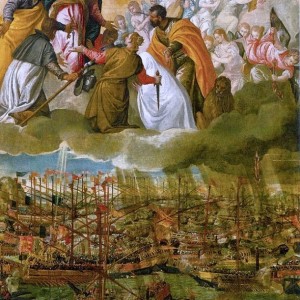
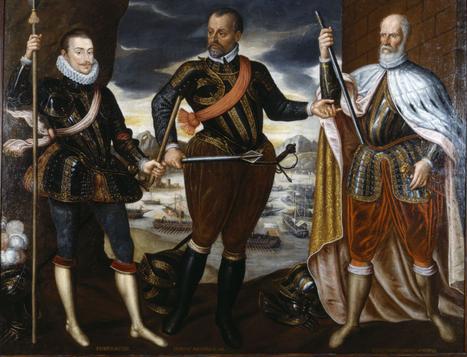
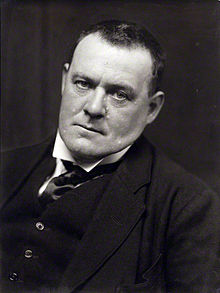
Deus vult!
This topic needs to be a big screen movie! I can see it already….” LEPANTO!”.
I don’t think people today realize how bad things have gotten, nor do they realize how bad things are going to get.
I recently saw a picture showing what Mecca is expected to look like in about 50 years…
http://i.imgur.com/H9e62kZ.jpg
In about 50 years, it’s probably going to look more like a mushroom cloud.
I’m not joking.
isis, and al-qaeda today are very much like the Jewish Zealots of Jesus’ day. When Jesus told his followers that the Temple would be destroyed, he wasn’t predicting the future, he was merely seeing the present more clearly than anyone else. What the Romans had done to Carthage, Corinth, the Spartacus Rebels, they would do to Jerusalem and the Jews if they went too far.
They did go too far, and in 69 AD, there was the siege of Jerusalem, and then a little while later there was the Bar Kokhba Revolt, and Judaism as Jesus Mary and Joseph knew it, was utterly annihilated, leaving a small band of Pharisees left to pick up the pieces…
What America did to Berlin and Hamburg, Tokyo, Hiroshima, and Nagasaki, we will most likely have do to mecca and medina sometime this century.
What do you think the response will be to a Beslan style school hostage crisis in America? What about a dirty bomb going off in Times Square? If things get out of hand, that’s what America will have to do.
islam has failed, and is currently failing, just like the idea of Judaism was failing to the Zealots of Jesus’ day. They were supposed to come back from exile, and have a strong Israel to live in, with a strong king, a successor to King David to follow… Instead they came back from Babylon and found a bunch of Greek and Roman pagans running things and they were unable to do anything, and that drove them bonkers.
Similarly, the hajjis in the i.s. today are likewise going nuts!
In their minds: They are supposed to a part of a globe-spanning caliphate, from Morocco to Jakarta. The world is supposed to follow THEM. The world should be looking up to THEM. They are supposed to be the center of learning, scientific progress, military might. Instead they find themselves in 3rd rate nation-states, that, in their eyes, only pay lip service to their religion. Their people have some of the worst poverty-rates, illiteracy-rates, terrible health-care, and they are dependent on the goodwill of foreign “kufar” (plural of kafir, means infidel) for aid. They look up at the Moon and realize there are bunch of infidel flags up there. The look through their telescopes, and realize there are bunch of infidel-invented robots running around on Mars, or in orbit around Saturn, or heading out into the cosmos. The can’t build aircraft carriers, and they know it. They turn on TV and see infidel movies, shows, or infidel-inspired programming. They know, deep down, that if they really were following the truth, the world would be the opposite of what it currently is.
It’s one thing when you have a bunch of guys with knives, swords and shields, going up against a bunch of other guys with knives, swords, shields, as well as the most advanced technology being big bows and arrows. Its another thing when guns, bullets, bombs dropped from jets, and intercontinental ballistic missiles launch from submarines tipped with multiple, independently targeting nuclear warheads come into play.
And that is why I fear that this century is going to be more bloody than than the last century.